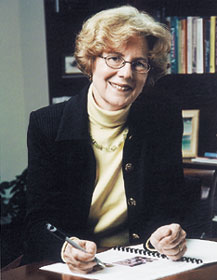

A publication of The Graduate School, University of North Carolina at Chapel Hill
Fountain Spring 2004
Home | Back issues | About us | The Graduate School | UNC-Chapel Hill | Make a gift

 |
Interdisciplinary collaboration and problem solving are two of the hallmarks of graduate study at Carolina. Everyday in classrooms and laboratories across campus, students make use of these approaches in their ongoing research. In doing so, they not only develop expertise in their respective disciplines, but also provide valuable knowledge to inform issues affecting communities throughout North Carolina and the entire world.
The Scholars for Tomorrow program
provides an excellent example of these dynamic ideas at work. Here we
see how graduate students from departments as different as nursing, economics,
or recreation and leisure studies can come together to grapple with difficult
health care questions, to challenge one
another’s presumptions and perspectives and to build a better foundation
for solving problems right here in North Carolina.
In their work, graduate students
not only bring new knowledge to the table, they also apply that knowledge
to the solution of real life problems. As part of a university, proudly
referred to as “The University of the People,” their commitment
to the state of North Carolina is never lost. In order to recognize the
contribution of these students, The Graduate School, with support from
the Graduate
Education Advancement Board, has established a new series of awards, the
IMPACT Awards.
One of the students who received this award last year, Hye-Chung Kum, is featured in this issue of The Fountain. By drawing on a unique combination of interdisciplinary approaches, Hye-Chung Kum applied knowledge from the field of computer science to benefit social work professionals across North Carolina.
Another example of the value of interdisciplinary approaches comes from the research of chemistry major Brian Nablo, also described here. Brian’s research draws on new knowledge about the properties of nitric oxide and applies that knowledge to the development of medical implants.
Read on and you will find even more impressive examples of how the research of Carolina graduate students makes a difference.
-Linda Dykstra
© 2004, The Graduate School, The University of
North Carolina at Chapel Hill
All text and images are property of The Graduate School
at the University of North Carolina-Chapel Hill. Contact Sandra Hoeflich
at shoeflic@email.unc.edu
to request permission for reproduction.